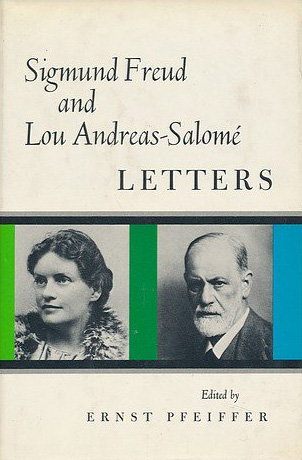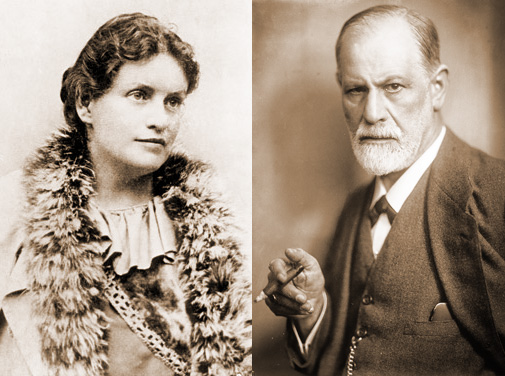Lou Andreas-Salomé, the First Female Psychoanalyst, on Human Nature in Letters to Freud
by Maria Popova
“The main thing is that life-faith is essentially and vitally present, by means of which we survive.”
 Russian-born poet, essayist, and intellectualLou Andreas-Salomé (February 12, 1861–February 5, 1937) created for herself a freedom that modern women have come to expect, at a time when such freedom was practically impossible. She became a philosopher in an era when women were neither expected nor even allowed to study philosophy and was a muse to Rilke, who wrote her passionate love lettersand dedicated his Book of Hours to her, and to Nietzsche, who set down his ten rules for writers in a letter to her and whose Thus Spoke Zarathustra was largely inspired by her.
Russian-born poet, essayist, and intellectualLou Andreas-Salomé (February 12, 1861–February 5, 1937) created for herself a freedom that modern women have come to expect, at a time when such freedom was practically impossible. She became a philosopher in an era when women were neither expected nor even allowed to study philosophy and was a muse to Rilke, who wrote her passionate love lettersand dedicated his Book of Hours to her, and to Nietzsche, who set down his ten rules for writers in a letter to her and whose Thus Spoke Zarathustra was largely inspired by her.
At the age of fifty, suddenly seeing the human problems she had previously examined through the lens of philosophy now best addressed by the young science of psychology, Andreas-Salomé became the world’s first female psychoanalyst. In the fall of 1911, she attended the Weimar Psycho-Analytical Congress and befriended Freud, whom she had first met a decade and a half earlier, soon becoming at once his muse, his disciple, and his intellectual peer. “Hoping that one day I shall have the opportunity of having a private conversation with you,” Freud wrote to her shortly after they met. The dream was consummated in their ensuing prolific correspondence, collected inSigmund Freud and Lou Andreas-Salomé: Letters (public library), where the two discussed each other’s papers and patients, exchanged views on everything from narcissism to anxiety to masturbation, traded perspectives on working methods, and pondered the psychology of the artist. They graced each other not only with admiring friendship — she addressed him by “Dear Professor” and he thanked her for the “pertinent and stimulating discussion” — but also with the assuring kinship of a shared dedication to the deepest human concerns: love, creativity, spirituality, death, the meaning of life.
But as much as their correspondence reveals a deep mutuality of values and ideas, it also sheds light on some meaningful psychological contrasts, the starkest of which is their divergent perspectives on human nature and the dominant hues of the human spirit. And what more powerful and poignant a trigger for contemplating these issues than bearing witness to humanity at its worst? In one of her earliest letters to Andreas-Salomé, penned on the cusp of WWI as two of his sons had entered the army, a pessimistic Freud writes:
I do not doubt that mankind will survive even this war, but I know for certain that for me and my contemporaries the world will never again be a happy place. It is too hideous. And the saddest thing about it is that it is exactly the way that we should have expected people to behave from our knowledge of psycho-analysis. Because of this attitude to mankind I have never been able to agree with your blithe optimism. My secret conclusion has always been: since we can only regard the highest present civilization as burdened with an enormous hypocrisy, it follows that we are organically unfitted for it. We have to abdicate, and the Great Unknown, He or It, lurking behind Fate will someday repeat this experiment with another race.
But decades later, as that “experiment” was indeed repeated in another world war, Freud’s views would change as he tussles with the subject in his little-known correspondence with Einstein — a change perhaps precipitated by Andreas-Salomé’s unflinching optimism about the human spirit. Indeed, in her response to Freud, she argues for the inherent duality of good and evil in each of us and for the choice we have, as individuals and a civilization, as to which half we feed — a choice that is essentially the ur-divide between hope and cynicism:
At one point it touches both your and my attitude to the distress of our time and what you called my optimism, which now seems so sadly shipwrecked. And yet I believe that behind every individual human activities and the territory which can be reached through psycho-analysis there lies an abyss where the most valuable and nastiest impulses inextricably condition each other and render impossible any final judgment. This remarkable mixture remains a fact not only for the once surmounted stage of earliest development (of the race as well as of the individual), but ever anew and for everyone this remarkable unity is a fact — calculated to cast down the arrogant, but also to exalt the lowly of heart. It is true that this makes no difference to our loathing for or our delight in a particular piece of human conduct, and a time like the present can consequently deal a death-blow to joy and confidence; but nevertheless one knows from oneself that one can only go on living in such an ultimate faith, and the same ought to apply to everyone else. Ought to: but of course it doesn’t, not in these days. However the fact that it ought to … that alone helps me a little.
In another letter, Andreas-Salomé adds:
The main thing is that life-faith is essentially and vitally present, by means of which we survive.
But these ideas about human nature predate Andreas-Salomé’s foray into psychoanalysis and crystallized decades earlier, during her days as a poet and philosopher. In fact, they shine most brightly in an 1882 poem titled “Hymn to Life,” which so inspired Nietzsche — her lover at the time — that he set it to music. The sentiment at its heart reverberates through her letters to Freud many years later.
HYMN TO LIFESurely, a friend loves a friend the way
That I love you, enigmatic life —
Whether I rejoiced or wept with you,
Whether you gave me joy or pain.
I love you with all your harms;
And if you must destroy me,
I wrest myself from your arms,
As a friend tears himself away from a friend’s breast.I embrace you with all my strength!
Let all your flames ignite me,
Let me in the ardor of the struggle
Probe your enigma ever deeper.To live and think millennia!
Enclose me now in both your arms:
If you have no more joy to give me —
Well then—there still remains your pain.
The whole of Sigmund Freud and Lou Andreas-Salomé: Letters is a forgotten treasure of formative ideas on the human psyche. Complement it with Rilke onthe tenacity of the human spirit and Tolstoy’s little-known correspondence with Gandhi on love, violence, and why we hurt each other.


No comments:
Post a Comment